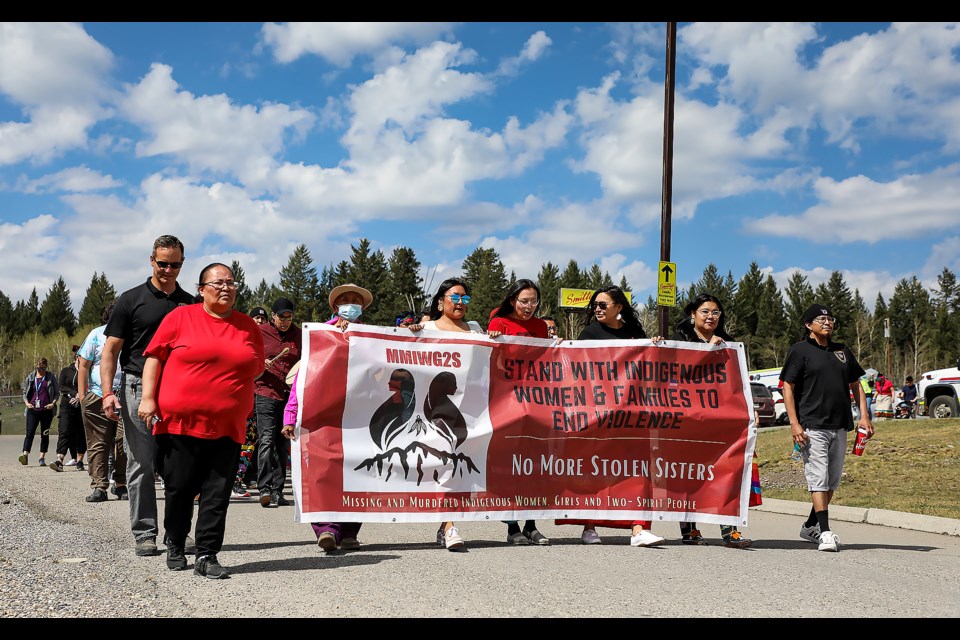ÎYÂRHE NAKODA – Danielle Lefthand’s voice rang loud and clear when she said she will not be another statistic.
Lefthand, of Îyârhe (Stoney) Nakoda First Nation, spoke in front of a crowd gathered on the Nation near the overpass of Highway 1X to raise awareness for missing and murdered Indigenous women and girls and two-spirited people (MMIWG2S) on Red Dress Day (May 5).
“As a woman, I am always alert,” she said. “I have to be aware of my surroundings wherever I go, even if it’s just the grocery store. I’m not going to be another statistic and I’m going to continue to spread awareness.”
Lefthand is part of Stoney Health Services’ Mînî Thnî Crisis Team, a 24-hour crisis and rapid outreach service available to the Mînî Thnî community. This was the team’s third year hosting an event to remember and encourage dialogue around MMIWG2S from the community and across the country.
For Heather Poucette, the day is full of mixed emotions. Like every day, she is reminded of her daughter, Keesha Crawler. She remembers her spirit fondly.
“It’s two years past, and now I’ve come to a point where there are still hard days, but I’m a little more at peace,” said Poucette. “It is hard, though, to realize I’m no longer worried about her, where she is or what she’s doing.”
In the early morning hours of April 18, 2021, Crawler was found dead on Highway 1A. An RCMP investigation indicated Crawler exited a moving vehicle driven by her then-boyfriend, Bryan Kelrick House Jr.
Police charged Kelrick House Jr. with one count of criminal negligence causing death as it was revealed Crawler had been placed back in the vehicle after sustaining serious injuries exiting from it, only to later be left on the road. Kelrick House Jr. did not call emergency personnel for help.
Crawler left two young children, now five and eight years old, in the care of her parents. Poucette said she misses her daughter every day, but it’s a blessing to see her reflected in her grandchildren – attitude and all.
Chiniki councillor Verna Powderface, one of two women on Stoney Tribal Council, said the Nation is losing too many young mothers.
“In this community, we are losing a lot of young people, a lot of young mothers, and that is a reflection of our history – it’s not a very good history to remember, but our people are resilient. That’s why we are still here today,” she said.
Powderface emphasized that connecting with culture, speaking Stoney and listening to elders, is a crucial part of paving the way towards healing and strengthening as a community for all people.
“You’ve got to speak it and live it to bring us back to our spirits. Our spirits are lost out there. These young people that are dying, their spirits are lost,” said Powderface. We’ve got to bring them back to themselves.”
Statistics show in Canada, Indigenous women and girls are 12 times more likely to be murdered or missing than any other group of women. Between 2001 and 2015, homicide rates for Indigenous women were nearly six times higher than for non-Indigenous women, according to Statistics Canada.
Stoney Nakoda/Kananaskis RCMP Sgt. Scott Stafford said the opioid crisis the community is dealing with right now creates more risk and vulnerability for the population. He said it’s also often the reason for short-term missing persons reports.
Stafford said RCMP will always be available to receive information about missing loved ones and will continue to be committed partners in the community to decrease violence against Indigenous women and girls.
“It is with this commitment in mind that we stand with you here today,” he told the crowd.
Chiniki First Nation Chief Aaron Young, representing one of three Îyârhe Nakoda Nations, said it’s crucial that RCMP, the community, and all levels of government work together to further the recommendations outlined in the final report of the National Inquiry into MMIWG.
On May 2, the House of Commons unanimously backed a motion declaring the deaths and disappearances of Indigenous women and girls a Canada-wide emergency. It also called for funding a new system to alert the public when someone goes missing.
But Young isn’t satisfied with the federal government’s pacing on the issue, with the National Inquiry’s final report having been released four years ago.
“There just needs to be more,” said Young. “And we need to at least be able to support our grassroots people … These programs that support those in need because of this crisis need funding because everything’s grassroots right now. We have to do whatever we can in our community, our reserve, our First Nation, to get to the heart of this matter for the good of all our people.”




